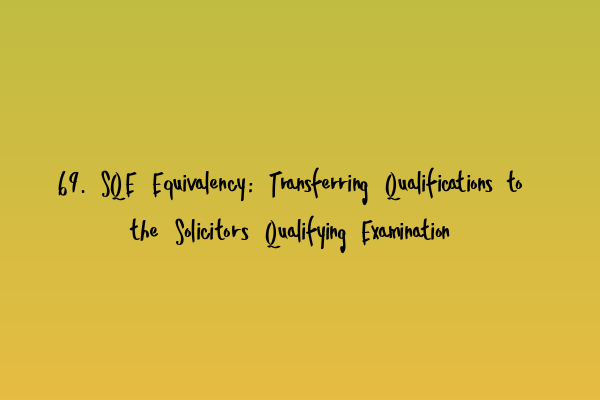69. SQE Equivalency: Transferring Qualifications to the Solicitors Qualifying Examination
Are you a qualified lawyer, looking to transfer your qualifications and join the legal profession in England and Wales? The Solicitors Qualifying Examination (SQE) provides a pathway for lawyers to demonstrate their knowledge, skills, and practical experience to become qualified solicitors in England and Wales.
In this blog post, we will discuss the process of transferring your qualifications to the SQE and provide valuable information on how to navigate this transition smoothly. So, let’s dive in and explore the world of SQE equivalency!
Understanding SQE Equivalency
Before we delve deeper, let’s clarify what exactly we mean by SQE equivalency. In simple terms, SQE equivalency refers to the process of transferring existing legal qualifications to the newly implemented SQE qualification.
Previously, individuals wishing to qualify as solicitors in England and Wales had to follow the traditional routes, such as completing the Legal Practice Course (LPC) and/or a training contract. However, with the introduction of the SQE, the landscape has changed, allowing lawyers with relevant qualifications to transfer and demonstrate their competence through the new examination.
Eligibility Criteria for SQE Equivalency
Now that we understand the concept of SQE equivalency let us explore the eligibility criteria for transferring your qualifications to the SQE. The Solicitors Regulation Authority (SRA) has outlined the following requirements:
- A recognized law degree: It is essential to hold a qualifying law degree or an equivalent qualification. If you have obtained your legal qualifications from a different jurisdiction, you may need to undertake a formal evaluation of your qualifications to determine their comparability.
- Equivalent prior qualifications: As an alternative to a qualifying law degree, individuals may hold an equivalent qualification, such as a Graduate Diploma in Law (GDL) or Common Professional Examination (CPE).
- Legal work experience: Along with the academic qualifications, applicants must have completed a specified period of legal work experience. The exact requirements may vary, and it is recommended to consult the SRA guidelines or speak to an SQE expert to determine what qualifies as acceptable experience.
Once you have assessed your eligibility, the next step is to proceed with the application process, which typically involves submitting an application form along with any supporting documents required by the SRA.
Preparing for the SQE Examinations
Now that you have successfully transferred your qualifications to the SQE, it’s time to start preparing for the examinations. The SQE consists of two stages: SQE1 and SQE2.
SQE1:
The first stage, SQE1, assesses your application of legal knowledge through multiple-choice questions (MCQs) and written tasks. To excel in this stage, it is crucial to have a strong understanding of key legal principles and be able to apply them in practical scenarios.
To enhance your chances of success, consider utilizing resources such as practice exam questions and practice mocks, which can help you familiarize yourself with the format and content of the SQE1 examination. You can find these resources and more on our website:
SQE2:
The second stage, SQE2, focuses on assessing your practical legal skills. This stage involves simulated legal tasks, such as client interviewing, advocacy, and legal research. To excel in the SQE2 examination, it is essential to develop strong practical skills through hands-on training and practice.
Consider enrolling in specialized SQE 2 preparation courses, which can provide you with the necessary guidance and support to refine your practical skills. Our SQE 2 Preparation Courses offer comprehensive training and expert guidance to help you succeed in this stage of the examination. You can find more information on our website:
Important Considerations
It is essential to keep the following considerations in mind when transferring your qualifications to the SQE:
- Deadlines: Stay updated with the latest SRA SQE exam dates and ensure that you submit your application and register for the relevant examination within the specified deadlines. You can find the SRA SQE exam dates on our website:
- Preparation: Dedicate sufficient time to study and prepare for the SQE examinations. Develop a structured study plan and take advantage of the available resources, including online materials, practice questions, and professional guidance.
- Seek Expert Assistance: Transferring qualifications and preparing for the SQE examinations can be overwhelming. Don’t hesitate to seek expert assistance from SQE tutors and professionals who can provide valuable support and guidance throughout the process.
By keeping these considerations in mind and being proactive in your preparation, you can enhance your chances of success in the SQE examinations and ultimately join the legal profession in England and Wales as a qualified solicitor.
Conclusion
The SQE provides an exciting opportunity for qualified lawyers to transfer their qualifications and demonstrate their competence through a new standardized examination. By accurately assessing your eligibility, preparing diligently, and seeking expert guidance, you can navigate this transition effectively and achieve your goal of qualifying as a solicitor in England and Wales.
If you are ready to take the next step in your legal career and explore SQE equivalency, contact us today to learn more about our SQE 1 and SQE 2 preparation courses, practice resources, and expert guidance. Together, we can help you navigate the path to success!
